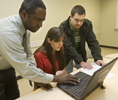Southeastern students learn sociology research techniques first hand
Contact: Rene Abadie
1/25/06

Caption:
CAMPUS TO COMMUNITY -- Yanyi Djamba, left, assistant professor of sociology at Southeastern Louisiana University, reviews data collected in a White Castle community needs survey with graduate students Shannon Forbes Rushing and Sean Guidry. The students gained valuable experience in sociological research methods by helping to conduct the actual interviews as well as compiling the data collected.
HAMMOND -- For the 13 graduate students taking Yanyi Djamba’s applied research class at Southeastern Louisiana University last semester, the experience was anything but a dry classroom exercise in research methods.
Instead, the applied sociology students learned first hand the research methods they will use in their future careers when they conducted a community needs survey for the town of White Castle in Iberville Parish. The data collected from White Castle residents will be used by the town to apply for state Community Development Block Grants.
An assistant professor of sociology, Djamba explained that students received appropriate training in survey design and implementation before going into the field and conducting more than 160 door-to-door interviews of randomly selected White Castle residents. Those surveys were supplemented with an additional 150 interviews done by municipal employees.
The fact that this was a real study, and not simply a theoretical academic exercise, had a significant impact on the students involved.
“Applied sociology involves finding answers for real world problems,” said student Shannon Forbes Rushing of Gonzales, who went door-to-door surveying individuals and ensuring that all questions were answered completely. “This study involved a real town with real people and problems. Knowing the data collected would benefit the individuals of the town made a difference in my attitude and provided a certain level of self-satisfaction.”
Students reported some negatives associated with the experience, namely the intense heat of south Louisiana and swarms of flies common to agricultural areas such as Iberville Parish.
“There may have been a million little things that could make for a bad day,” recalled Sean Guidry of Venice. “But the fact that I was out there actually doing something that could help people while experiencing and learning something new far outweighed any negatives there may have been.”
The reception the students received from residents ranged from reticence and suspicion to welcoming and forthcoming.
“By far, most of the people were very receptive and eagerly participated in the study,” said Guidry “At one point I interviewed a nice young lady and she accompanied me throughout her neighborhood giving me input on the residents and pointing out houses where no one lived.”
“Once they were assured of confidentiality and understood that their input would benefit their community and quality of life, most were anxious to participate,” added Rushing. “They seemed to enjoy being provided with the opportunity to share their views.”
Djamba said the survey contained the usual demographic questions that identify age, gender, race and occupation, but also focused on community issues or problems and the relative seriousness of these problems as perceived by the interview subjects. He noted that the students learned first hand how applied sociology can help communities through a needs assessment survey that produces important information for decision-making and socio-economic development.
“While the town of White Castle gained accurate and up-to-date information about community needs, this project gave students the opportunity to participate in an actual research process and develop the necessary skills and experiences needed to perform survey research design and implementation,” he added. “In addition, the students performed the data entry and cleaning, which gave them additional experience on these two important steps of quantitative research.”
While preparing to do the surveys, the Southeastern students had the opportunity to interact with White Castle Mayor Maurice Brown and other town officials. “The mayor was genuinely interested in our survey and the possibility that it could help the individuals of his community gain a better quality of life,” Rushing said.
“Real world problems involve real people, and all too often we are caught up in the paper trail and forget there are faces attached to the numbers,” she added. “Meeting these individual residents face to face makes you want to help them, and not just through the survey. By having the opportunity to associate with the people of White Castle and to be invited into their homes, you learn something about each of these individuals on a personal level and you feel a certain sense of responsibility.”
“This was a win-win project all-around,” said Guidry. “Students learned from the actual experience, and the people of White Castle will benefit from the data collected. You can’t beat that.”
More News...